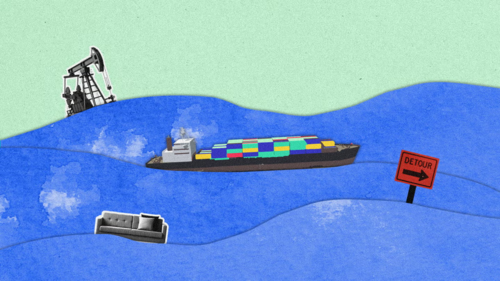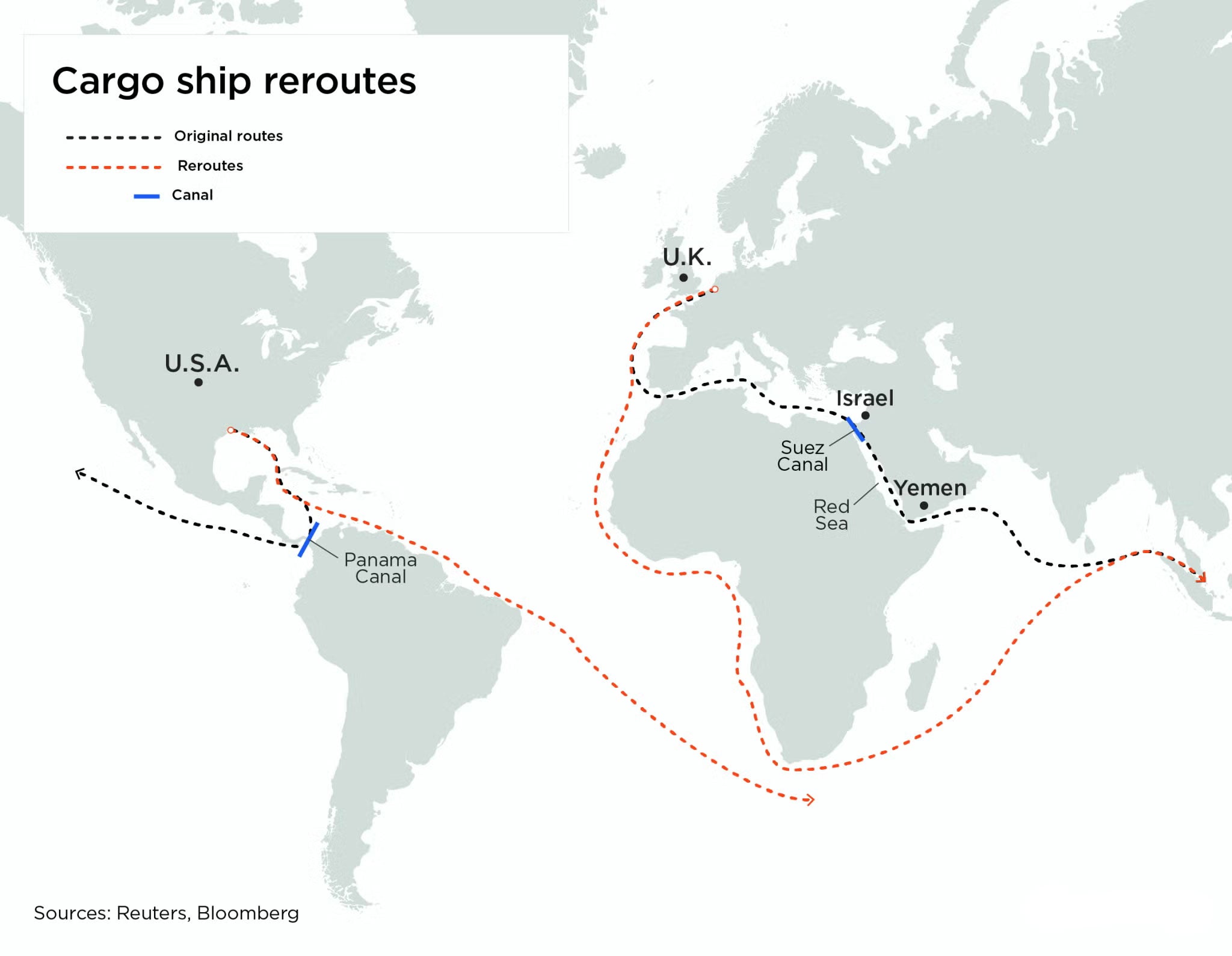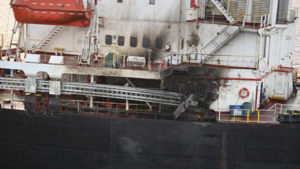What Happens When Ships Can't Cross the Red Sea and Panama Canal?

Houthi attacks in the Red Sea and drought in the Panama Canal are delaying shipments and could increase emissions.
In short: Over 90% of the world’s traded goods are transported by ship, according to the Organisation for Economic Co-operation and Development, but the conflict in the Red Sea and a drought in the Panama Canal region are delaying ships or causing them to reroute. These disruptions have increased shipping costs, prompting fears of inflation. Rerouted ships must also travel farther distances, and some companies are switching to air shipments, both of which will increase the shipping industry’s already high greenhouse gas emissions.
What’s Going on in the Red Sea?
Almost 15% of all global trade conducted by sea passes through the Red Sea, including 8% of all globally traded grain and 12% of all oil transported by ship, according to a joint statement from the U.S. and 13 other countries.
Since mid-November, the Yemen-based Houthis have been launching drone and missile attacks in the Red Sea in an effort to keep ships from delivering goods to Israel and force a cease-fire in the Gaza Strip.
Companies have responded by sending ships around the southern tip of Africa to avoid going through the Red Sea, which can add at least a week of travel time. In other instances, shipping companies have turned to air freight, which is usually more expensive and has less capacity when it comes to how much can be shipped per load.
Tesla and Volvo factories in Europe have already had to pause some production because the delays have caused a shortage of needed materials. Ikea has said that the delays could cause a shortage of certain products from the popular Swedish furniture company.

Sea-Intelligence, a supply chain advisory firm, said the effect on weekly shipping capacity caused by the conflict in the Red Sea is “even larger than the early pandemic impact.”
A coalition of countries, led by the U.S., was formed in late 2023 to protect shipping routes in the Red Sea, but countries have been hesitant to join, and the Houthis have warned that any country involved in the coalition will be targeted.
After delivering a series of warnings that went ignored, the U.S. and U.K. launched a strike in Yemen early on Jan. 12 local time. The U.S. struck Houthi targets for the sixth time on Jan. 19, then the U.S. and U.K. struck Houthi targets in Yemen again on Jan. 22.
A spokesperson for the Houthis told Al Jazeera the group will not stop attacking shipping routes, even amid U.S. attacks on Houthi targets. As of Jan. 19, Reuters reported that the Houthis don’t plan to expand their attacks beyond preventing ships from getting to Israel and retaliating in response to U.S. and U.K. attacks.

This photograph provided by the Indian Navy shows US-owned ship Genco Picardy that came under attack Wednesday from a bomb-carrying drone launched by Yemen's Houthi rebels in the Gulf of Aden, Thursday, Jan.18, 2024.
What’s Going on in the Panama Canal?
Due to severe drought in the region, authorities recently cut the number of ships allowed to pass through the Panama Canal by 36%. As of Jan. 18, the wait time for a ship wanting to get through the canal was anywhere from two to 55 days, depending on the type of ship and whether it was northbound or southbound, according to global port agency WaterFront Maritime Services.
The delay has caused some shipping companies to reroute through the Suez Canal, which has also become difficult to pass through due to the Houthis’ attacks in the Red Sea. CNBC reported that so far, 90% of container ships going to the Suez Canal have been rerouted.
Increasingly longer routes and delays could also cause a shortage of shipping containers, prompting what’s known as a “container crunch,” which could lead to even more delays.
What’s the Human Impact of These Shipping Changes?
Extended routes and delayed shipping can cause increased consumer prices and risk of harm to the environment.
As a result of the conflict in the Red Sea and the drought in the Panama Canal, shipping costs are rising, and with shipments delayed, there are fears that oil and retail prices could increase. Oil prices are already increasing and retailers are stocking up on their product in an attempt to avoid shortages.
Longer shipping routes could also have negative environmental impacts. Prior to these reroutes, the shipping industry was responsible for 3% of global greenhouse gas emissions, World Bank economist Dominik Englert said on the organization’s infrastructure podcast, “Tell Me How.” Englert specializes in sustainable shipping.
“If shipping was a country, it would be the sixth largest greenhouse gas emitter worldwide, ranking between Japan and Germany,” he said.
Many ships that go from Asia to Europe are being rerouted around the southern tip of Africa, emitting more carbon dioxide along the way. For example, a ship traveling from Shenzhen in southern China to Rotterdam in the Netherlands adds over 3,000 nautical miles to its trip when it reroutes around the Cape of Good Hope, increasing carbon dioxide emissions by about 14,000 metric tons, according to Reuters’ global energy transition columnist Gavin Maguire.
Ships are also going faster to account for the time lost during the longer journey, Maguire writes, which also increases emissions. A switch to air freight also drastically increases emissions.
A 2014 study found that a plane carrying the same amount of product for the same distance as a boat emitted 44 times more carbon dioxide equivalent, a unit used to compare greenhouse gas emissions, than the boat. Air freight also has less capacity compared to shipping by boat, meaning more planes will need to take off in order to transport the same amount of product, emitting even more carbon dioxide.

